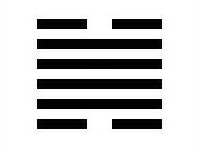
Hexagram 28 - Ta Kuo / Preponderance of the Great - James Legge Translation

- Above Tui the Joyous, Lake
- Below Sun the Gentle, Wind, Wood
Meaning
Ta Hwo suggests to us a beam that is weak. There will be advantage in moving (under its conditions) in any direction whatever; there will be success.
Meaning Commentary
Very extraordinary times require very extraordinary gifts in the conduct of affairs in them. This is the text on which king Wan and his son discourse after their fashion in this hexagram. What goes, in their view, to constitute anything extraordinary is its greatness and difficulty. There need not be about it what is not right.
Looking at the figure we see two weak lines at the top and bottom, and four strong lines between them, giving us the idea of a great beam unable to sustain its own weight. But the second and fifth lines are both strong and in the centre; and from this and the attributes of the component trigrams a good auspice is obtained.
<-Prev Next->The Image
The lake rises above the trees: The image of Preponderance of the Great. Thus the superior man, when he stands alone, is unconcerned and if he has to renounce the world he is undaunted.
Image Commentary
Extraordinary times when the great preponderates are like flood times when the lake rises over the treetops. But such conditions are temporary. The two trigrams indicate the attitude proper to such exceptional times: the symbol of the trigram Sun is the tree, which stands firm even though it stands alone, and the attribute of Tui is joyousness, which remains undaunted even if it must renounce the world.
King Wans explanation
- Ta Hwo shows the great ones (the undivided lines) in excess.
- In the beam that is weak we see weakness both in the lowest and the topmost lines.
- The strong lines are in excess, but (two of them) are in the central positions. The action of the hexagram is represented by the symbols of flexibility and satisfaction. Hence it is said, There will be advantage in moving in any direction whatever; yea, there will be success.
- Great indeed is the work to be done in this very extraordinary time.
Legge Footnotes on King Wans explanation
Paragraph 3. In the Great Symbolism wood appears as the natural object symbolized by Sun, and not wind, which we find more commonly. The attribute of flexibility, however, is the quality of Sun, whether used of wind or of wood.
Paragraph 4. Such a time, it is said, was that of Yao and Shun, of Thang the Successful, and of king Wu. What these heroes did, however, was all called for by the exigency of their times, and not by whim or principle of their own, which they wished to make prominent.
The Lines
The first SIX, divided, shows one placing mats of the white mao grass under things set on the ground. There will be no error.
Line 1 being weak, and at the bottom of the figure, and of the trigram Sun, which denotes flexibility and humility, its subject is distinguished by his carefulness, as in the matter mentioned; and there is a good auspice.
The second NINE, undivided, shows a decayed willow producing shoots, or an old husband in possession of his young wife. There will be advantage in every way.
Line 2 has no proper correlate above. Hence he inclines to the weak 1 below him; and we have the symbolism of the line. An old husband with a young wife will yet have children; the action of the subject of 2 will be successful.
The third NINE, undivided, shows a beam that is weak. There will be evil.
Line 3 is strong, and in an odd place. Its subject is confident in his own strength, but his correlate in 6 is weak. Alone, he is unequal to the extraordinary strain on him, and has for his symbol the weak beam.
The fourth NINE, undivided, shows a beam curving upwards. There will be good fortune. If the subject of it looks for other help but that of line one, there will be cause for regret.
Line 4 is near 5, the ruler's place. On its subject devolves the duty of meeting the extraordinary exigency of the time but he is strong and, the line being in an even place, his strength is tempered. He will be equal to his task. Should he look out for the help of the subject of 1, that would affect him with another element of weakness; and his action would give cause for regret.
The fifth NINE, undivided, shows a decayed willow producing flowers, or an old wife in possession of her young husband. There will be occasion neither for blame nor for praise.
Line 5 is strong and central. Its subject should be equal to achieve extraordinary merit. But he has no proper correlate below, and as 2 inclined to 1, so does this to 6. But here the willow only produces flowers, not shoots; its decay will soon reappear. An old wife will have no children. If the subject of the line is not to be condemned as that of 3, his action does not deserve praise.
The topmost SIX, divided, shows its subject with extraordinary boldness wading through a stream, till the water hides the crown of his head. There will be evil, but no ground for blame.
The subject of 6 pursues his daring course, with a view to satisfy the extraordinary exigency of the time, and benefit all under the sky. He is unequal to the task, and sinks beneath it; but his motive modifies the judgment on his conduct.
